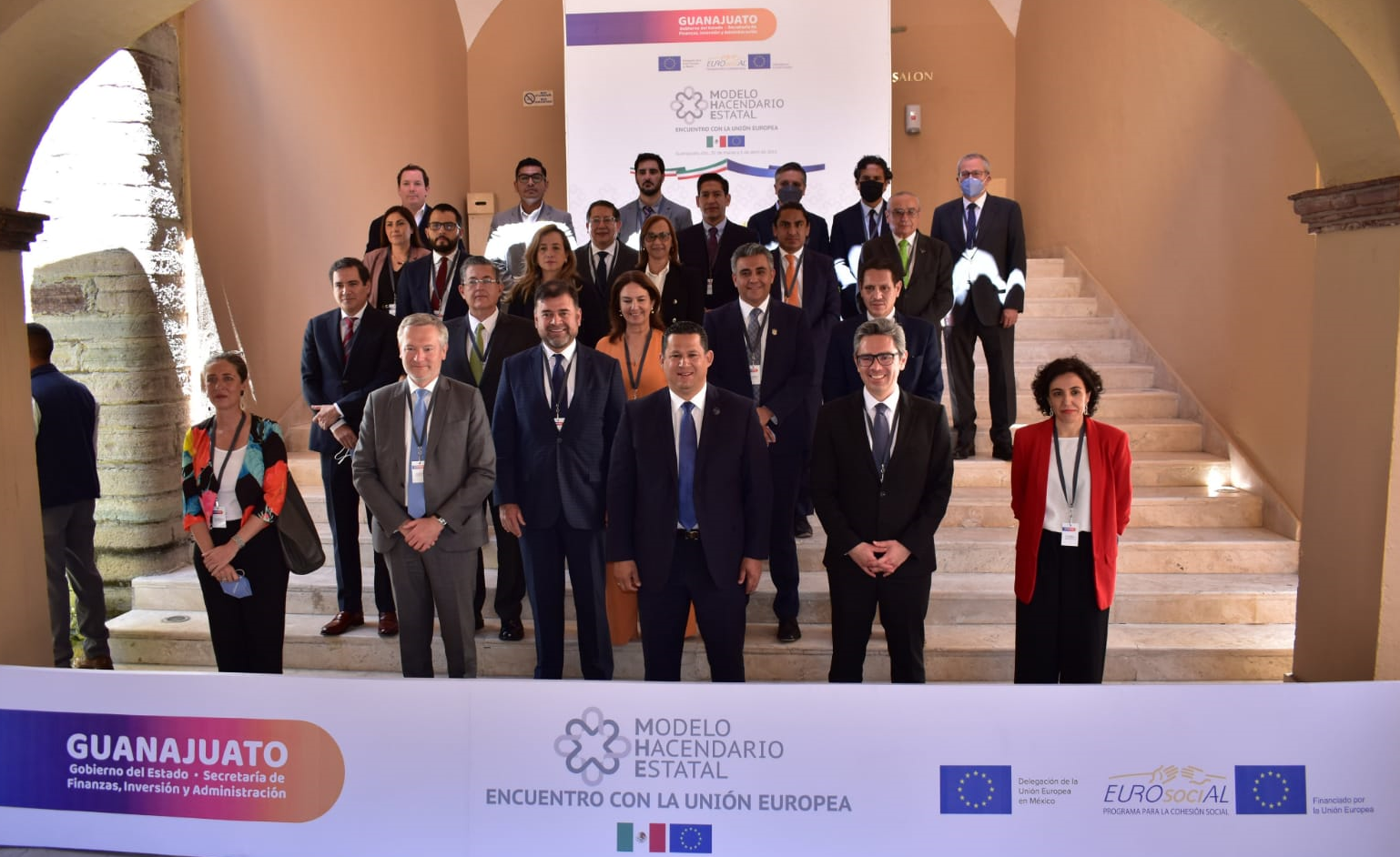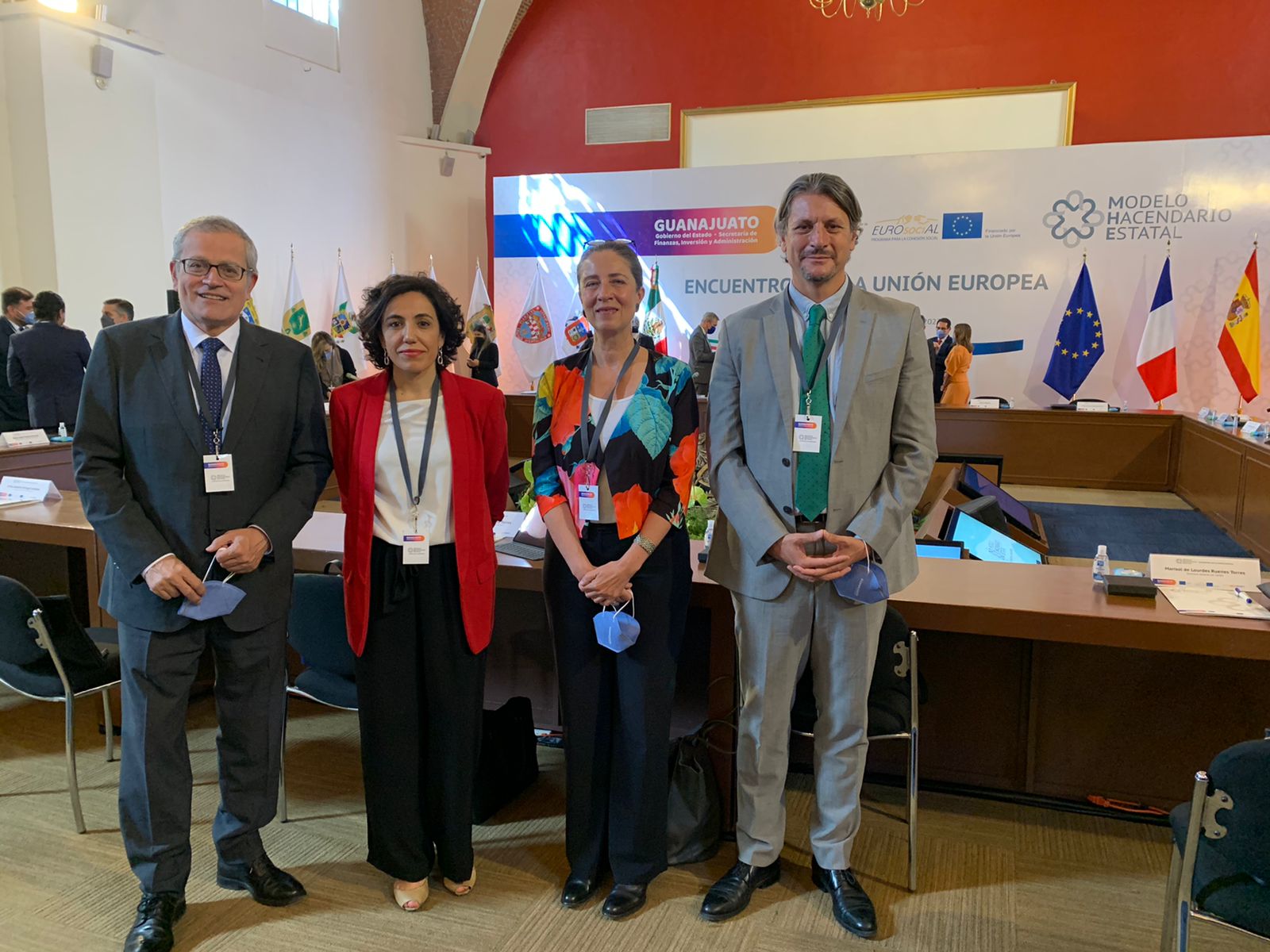The Governor of the State of Guanajuato, EU Ambassador to Mexico, finance secretaries from ten Mexican states, coordinator of the governance area of EUROsociAL+ and director of the Institute of Fiscal Studies of Spain participate in the meeting with the European Union: State Treasury Model.

Foto cortesía del Gobierno de Guanajuato
As part of the Europe Team Initiative for Social Cohesion, the European Union Delegation in Mexico, the secretary of finance, investment and administration of the State of Guanajuato and the EUROsociAL+ programme of the European Union organised the “Meeting with the European Union: State Treasury Model” for today and tomorrow in Guanajuato. The event, in which ten finance secretaries from the states of Aguascalientes, Chihuahua, Coahuila, Guanajuato, Jalisco, Morelos, Nuevo León, Querétaro, Yucatán, Zacatecas will participate, is an opportunity to learn about good practices in the European Union and Latin America for implementing fiscal strategies and instruments with a specific focus on the sub-national level, which, together with the municipalities, is the area closest to citizens.
At the opening ceremony, the governor of the state of Guanajuato, Diego Sinhue, remarked that “this is a very timely effort to design a new tax model”, in a complex environment. In his speech, he said that Guanajuato has made major efforts to increase revenues and improve the quality of spending, and highlighted that “Guanajuato is a national leader in terms of transparency and accountability in the use of public resources”. Thanks to recent changes and innovations in the budget cycle by the Ministry of Finance, their institutional and operational capacities have been strengthened and a step has been taken with the incorporation of elements for mainstreaming gender, positioning the State of Guanajuato at the head of the country in the Diagnosis of the implementation of the Results-Based Budget and the Performance Evaluation System of the Federal Government’s Ministry of Finance and Public Credit.
The European Union ambassador in Mexico, Gautier Mignot, explained that Team Europe is made up of the EU, its Member States, funding institutions and implementing agencies: “It represents a new era of working better together. It is our response to a changing geopolitical landscape, which increasingly requires collective, rapid and decisive action at the multilateral and national levels”, he stressed. Ambassador Mignot added that Team Europe in Mexico and its Mexican counterparts have identified social cohesion for the reduction of inequalities as a priority area for the coming years, “for which we will work with the state secretaries of public finance” to have fiscal policies that correct inequalities and protect the most vulnerable sectors of society. To do this, the good practices taken will be the work model implemented since 2019 by the secretary of finance of the State of Guanajuato and the EUROsociAL+ EU programme, led by the FIIAPP.
Fiscal policy and mobilisation of domestic resources
In the wake of a strong economic rebound in 2021, the Latin American and Caribbean region faces a difficult outlook for 2022 and 2023. To maintain a sustainable public spending trajectory, it will be necessary to mobilise domestic resources. Opportunities for discussion such as the event in Guanajuato enable the states to share their experiences, problems and bottlenecks, and learn what is being done in the EU and other countries in the region in the post-pandemic reconstruction phase.
Participating authorities
These sessions, which are held at the Hotel ExHacienda San Xavier, will include authorities such as Héctor Salgado Banda, Secretary of Finance, Investment and Administration of the state of Guanajuato; Carlos de Jesús Magallanes García, Secretary of Finance of the state of Aguascalientes; José de Jesús Granillo Vázquez, Secretary of the Treasury of the state of Chihuahua; Blas José Flores Dávila, Secretary of Finance of the state of Coahuila; Olga Rosas Moya, Secretary of Administration and Finance of the state of Yucatan; Juan Partida Morales, Secretary of the Public Treasury of the state of Jalisco; Mónica Boggio Tomasaz Merino, Secretary of the Treasury of the state of Morelos; Carlos Alberto Garza Ibarra, Secretary of Finance and General Treasurer of the state of Nuevo León; Gustavo Arturo Leal Maya, Secretary of Finance of the state of Querétaro; Ricardo Olivares Sánchez, Secretary of Finance of the state of Zacatecas; Eduardo Bohórquez, Executive Director of Mexican Transparency; and the Director of the Institute of Fiscal Studies of Spain, Alain Cuenca, among others.




